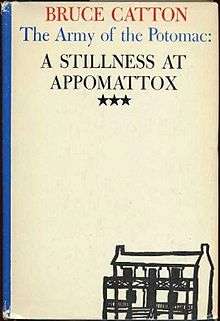A Stillness at Appomattox
 First edition | |
| Author | Bruce Catton |
|---|---|
| Country | United States |
| Language | English |
| Series | Army of the Potomac trilogy |
| Subject | American Civil War |
| Publisher | Doubleday and Company |
Publication date | 1953 |
| Pages | 438 |
| Preceded by | Glory Road |
A Stillness at Appomattox (1953) is an award-winning, non-fiction book written by Bruce Catton.[1] It recounts the American Civil War's final year,[1] describing the campaigns of Ulysses S. Grant in Virginia during 1864 to the end of the war in 1865. It is the final volume of the Army of the Potomac trilogy that includes Mr. Lincoln's Army (1951) and Glory Road (1952).[1]
Content
A Stillness at Appomattox is a history on the American Civil War that recounts the final year.[1] Some of Catton's extensive work describes the Battle of the Wilderness,[2] the assault of the Mule Shoe at the Battle of Spotsylvania Court House,[3] the Battle of Cold Harbor,[4] the Battle of the Crater[5] and the Battle of Appomattox Courthouse.[6]
Catton's work describes the campaigns of Ulysses S. Grant in Virginia during 1864. The lengthy work follows Grant's campaigns from early 1864 to the end of the war.[7] Other American Civil War generals he describes include George Gordon Meade, Philip Sheridan, and Robert E. Lee.[1][7]
It is the third volume of the Army of the Potomac trilogy that includes Mr. Lincoln's Army (1951) and Glory Road (1952).[1]
Sources
Notes at the end of the book show that Catton used various collections of unpublished letters written by Federal soldiers, personal diaries of spouses and relatives, memoirs of soldiers and their families and official war records.[8] These are described in length as they pertain to the various chapters at the end of Catton's work.[9] Also here are many autobiographies, biographical studies and memoirs of descendents of soldiers and ranking personnel.[8] There is even a collection of letters referenced from Major General U.S. Grant III on recalling anecdotes and family recollections about his famous grandfather Ulysses S. Grant.[10]
Catton notes that he relied heavily on War of the Rebellion: A Compilation of the Official Records of the Union and Confederate Armies published by the United States Department of War in 1902.[11] Other major works he consulted were Appleton's Cyclopedia of American Biography (1888), edited by James Grant Wilson and John Fiske, and Dictionary of American Biography (1943), edited by Dumas Malone.[10] Catton also provides a list of over 200 other works he consulted in a Bibliography for this work.[12]
Awards
- A Stillness at Appomattox won the 1954 National Book Award for Nonfiction.[1][13]
The citation of the award reads:
- Mr. Catton has combined historical accuracy with poetic insight to present the story of the Army of the Potomac in the final year of the Civil War. Writing from the point of view of the citizens who found themselves soldiers he has reaffirmed the great American tradition of a peace-loving people who, faced with necessity, can also produce greatness in war. [7][14]
- A Stillness at Appomattox won the 1954 Pulitzer Prize for History.[15]
Bruce Catton
Bruce Catton (1899 — 1978) was a journalist and a notable historian of the American Civil War. Catton was known as a narrative historian who specialized in popular histories that emphasized the colorful characters and vignettes of history, in addition to the simple dates, facts, and analyses. His works, although well-researched, were generally not presented in a rigorous academic style, supported by footnotes. In the long line of Civil War historians, Catton is arguably the most prolific and popular of all, with Shelby Foote his only conceivable rival. Oliver Jensen, who succeeded him as editor of American Heritage magazine, wrote: "There is a near-magic power of imagination in Catton's work that seemed to project him physically into the battlefields, along the dusty roads and to the campfires of another age."
References
- 1 2 3 4 5 6 7 "National Book Award Classics": Bruce Catton, A Stillness at Appomattox, reprint of May 2003 essay by Neil Baldwin. Retrieved 2012-02-20.
- ↑ Catton, pp. 55-92.
- ↑ Catton, pp. 117-128.
- ↑ Catton, pp. 149-173.
- ↑ Catton, pp. 142-253.
- ↑ Catton, pp. 374-380.
- 1 2 3 "The Army of the Potomac: A Stillness at Appomattox by Catton, Bruce". Retrieved 2008-05-20.
- 1 2 Catton, pp. 381-382.
- ↑ Catton, pp. 392-438.
- 1 2 Catton, p. 382.
- ↑ War of the Rebellion: A Compilation of the Official Records of the Union and Confederate Armies
- ↑ Catton, pp. 383-391.
- ↑ "National Book Awards – 1954". National Book Foundation. Retrieved 2012-02-20.
(With essay by Neil Baldwin from the Awards 50-year anniversary publications.) - ↑ "A Stillness at Appomattox The Army of the Potomac Trilogy, Vol 3". Retrieved 2008-05-20.
- ↑ "Pulitzer Prizes for 1954". Retrieved 2008-05-20.
- Citations
- Catton, Bruce, A Stillness at Appomattox, Doubleday 1953, Library of Congress # 53-9982, ISBN 0-385-04451-8